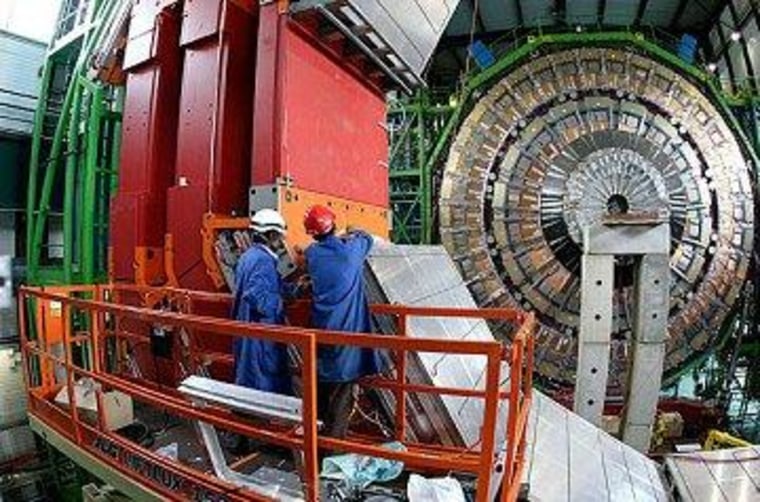The apparent Higgs boson breakthrough is a scientific triumph, but it's worth noting that this decades-long search could have happened sooner -- and on American soil -- had it not been for congressional budget cuts.
Brad Plumer explained this morning that American physicists were developing a particle accelerator three times as powerful as the Large Hadron Collider, but it was shut down when Congress pulled its funding. Plumer flagged this fascinating item from Steven Weinberg, a physicist and Nobel laureate involved in the planning back in the 1980s.
In the early 1980s the US began plans for the Superconducting Super Collider, or SSC, which would accelerate protons to 20 TeV, three times the maximum energy that will be available at the CERN Large Hadron Collider. After a decade of work, the design was completed, a site was selected in Texas, land bought, and construction begun on a tunnel and on magnets to steer the protons.Then in 1992 the House of Representatives canceled funding for the SSC. Funding was restored by a House–Senate conference committee, but the next year the same happened again, and this time the House would not go along with the recommendation of the conference committee. After the expenditure of almost two billion dollars and thousands of man-years, the SSC was dead.One thing that killed the SSC was an undeserved reputation for over-spending. There was even nonsense in the press about spending on potted plants for the corridors of the administration building. Projected costs did increase, but the main reason was that, year by year, Congress never supplied sufficient funds to keep to the planned rate of spending. This stretched out the time and hence the cost to complete the project. Even so, the SSC met all technical challenges, and could have been completed for about what has been spent on the LHC, and completed a decade earlier.
Now, this isn't necessarily about party. It's not even about the current crop of federal lawmakers, most of whom weren't even in Washington when this decision was made 20 years ago.
But the broader issue here relates to a point raised by a certain msnbc host in a certain "Lean Forward" promo.
I'm referring, of course, to Rachel's comments in front of the Hoover Dam.
"When you are this close to Hoover Dam, it makes you realize how small a human is in relation to this as a human project. You can't be the guy who builds this. You can't be the town who builds this. You can't even be the state who builds this. You have to be the country that builds something like this. This is a national project. This is a project of national significance. We've got those projects on the menu right now. And we've got to figure out whether or not we are still a country that can think this big."
Right. The Superconducting Super Collider would have been a very big project -- dealing with very small things -- that very likely would have produced a scientific breakthrough here, a decade ago. Instead, the investment was made in Europe, below the border of Switzerland and France.
I mention this because I think about Rachel's promo quite often, and the Higgs boson discovery reminded me of the point all over again. The United States can be home to breakthroughs like this -- we can have the most innovative energy grid, the fastest trains, the most dynamic educational institutions, the most ambitious space program, the most productive agricultural sector, and the most efficient health care system, but we have to figure out if we're "still a country that can think this big."
Being the global leader means making investments that keep us on top. If our national priorities are Mitt Romney's tax breaks and Paul Ryan's austerity, the world will still have breakthroughs; they just won't happen here.
